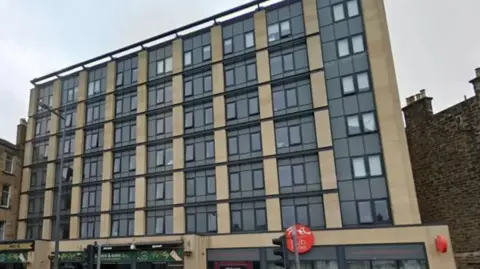Homeless could move from Edinburgh in licence plan
 Google
GoogleSome homeless people in Edinburgh could be moved out of the city as part of a plan to stop the use of unlicensed temporary accommodation before the end of the month.
City of Edinburgh Council has provided hundreds of rooms in hotels and B&Bs as temporary accommodation in response to soaring demand since the Covid pandemic.
The change of these properties into primary residences, as opposed to being for guests only, means they are legally required to be licensed as a house of multiple occupation (HMO).
But around 650 homeless people live in accommodation without a HMO licence and council officials trying to rehome them said about 10% of them could be temporarily moved outside of Edinburgh if they don't find enough spaces by 30 November.
Derek McGowan, Service Director for Housing and Homelessness at the City of Edinburgh Council, said the city had been offered about 70 external properties, mostly in neighbouring local authorities and none more than 50 miles away.
He said he didn’t think there would be a need to use them but added “we need to plan for it”.
He said: “I would say I’m confident at the moment there will be a place for everyone affected by this to stay.
“Predominantly what we’re trying to do is use our [housing] stock on a temporary basis, but whatever else licenced and suitable accommodation in the city we can find, we can use.
“The contingencies are there, if there is a need to use accommodation outwith the authority area we would make sure we are transporting people there and that would be on a short-term basis, as short as possible, so we can bring them back to the city and put them in our housing stock.”
Breaking the law
The initial decision to significantly increase the amount of unlicensed temporary accommodation available was taken at the start of the first Covid lockdown in 2020.
At the time, inspections of all the properties were made to ensure the safety requirements were met and landlords in breach of the rules were requested to register for an HMO licence.
Around 30 landlords did not do this and the council now plans to stop paying the unlicensed providers of HMO properties in early December.
This has been driven by the cost of the arrangement amidst soaring demand but also the fact the City of Edinburgh Council is committing a criminal offence by paying operators who did not comply with its own health and safety licensing requirements.
The council is also in breach of its HMO licensing duty by maintaining to support homeless households in some unlicensed properties.
 PA Media
PA MediaTo achieve its goal of ending the unlicensed HMO arrangement, the council has suspended applications for social housing.
EdIndex, the Edinburgh housing portal used by homeless individuals to bid for council houses, allows people to get on a waiting list for longer-term solutions.
Empty homes are usually advertised online but the site has been temporarily paused due to “unprecedented pressures”.
Non-essential repairs have also been paused until January to prioritise work to get more unoccupied or void homes back into use.
Mr McGowan said around 174 of these void council homes had been brought back into use in the past few week and around 120 more spaces for homeless people will be made available if current unlicensed providers’ applications to get HMO licences are granted in the next week.
The senior council official said the local authority is also working on another "commercially sensitive" arrangement to try and address the unlicensed HMO issue.
In May people presenting as homeless in Edinburgh, who were not already in temporary accommodation, were sent out of the city due to huge demand for hotel rooms created by Taylor Swift concerts.
